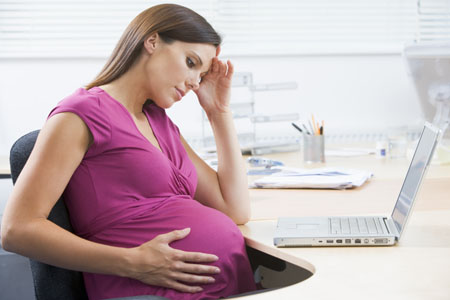RTMS and Other Treatments for Depression in Pregnancy
At the May meeting of the Society of Biological Psychiatry, researcher Deborah Kim gave a talk on the use of repeated transcranial magnetic stimulation (rTMS) for depression in women who are pregnant. In rTMS treatment, an electromagnetic coil is placed against the side of the forehead and magnetic pulses that can penetrate the scalp are converted into small electrical currents that stimulate neurons in the brain. Kim had recently completed an open study of rTMS in pregnant women, in which 70% of the women responded to rTMS. In another controlled randomized study of 30 women (also by Kim), 75% responded to active rTMS and 50% responded to a sham procedure. None of the women included had problems with the fetus or during delivery.
RTMS offers an alternative to women who are reluctant to take antidepressants during pregnancy. Kim cited data by Lee S. Cohen and colleagues in which women taking antidepressants show a 68% relapse rate if they stop taking these medications during pregnancy compared to a 26% relapse rate among those who continue taking antidepressants during pregnancy. Concerns about antidepressants’ potential effects on a fetus may have been overemphasized. Kim summarized the literature on antidepressants in pregnancy, concluding that there is a preponderance of evidence that antidepressants are safe for the mother and fetus, with few serious effects having been observed. Some researchers have been concerned about risks of persistent pulmonary hypertension or autism among offspring of women who took antidepressants during pregnancy, but studies have shown that the absolute risk of either is small. Stay tuned—on Wednesday we’ll discuss a new large and comprehensive study in which most SSRIs showed no link to birth defects, but fluoxetine and paroxetine were associated with risks of certain birth defects.
Editor’s Note: For mild depression during pregnancy, exercise and psychotherapy might be optimal, along with folate and vitamin D3. For moderate depression, omega-3 fatty acids might also be helpful, but it now appears that rTMS would be less risky than electroconvulsive therapy (ECT), which in the past has been a typical recommendation for pregnant women, but which exposes the fetus to the effects of anesthesia and seizure. In her summary Kim recommended that women with a pattern of recurrent depression continue antidepressant treatment, especially since a mother’s depression itself poses non-trivial risks to the fetus.


